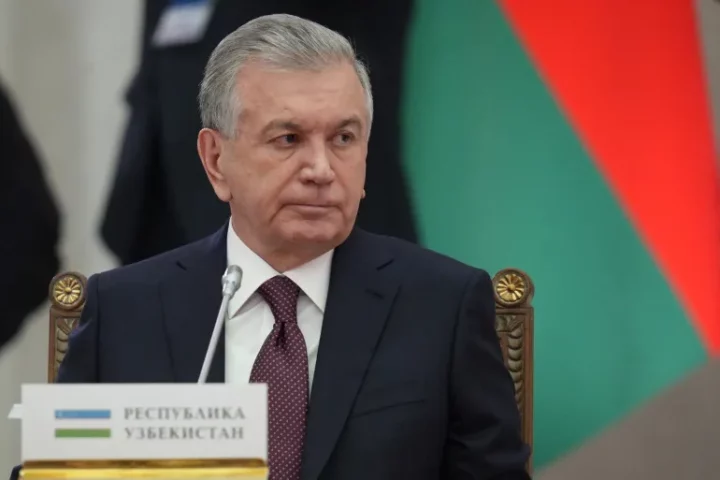Shavkat Mirziyoyev (Uzbek: Shavkat Miromonovich Mirziyoyev; born 24 July 1957) is the current President of Uzbekistan, in office since 2016. He served as Prime Minister of Uzbekistan from 2003 to 2016. He assumed office on December 14, 2016, following the death of long-time President Islam Karimov. Here is a biography, overview of his activities, achievements, reforms, and prospects up to that date:
Biography: Uzbek President Shavkat Mirziyoyev was born on July 24, 1957, in Jizzakh, Uzbek SSR, which was then part of the Soviet Union. He pursued higher education in Tashkent and later held various positions within the Uzbek Soviet Socialist Republic and the independent Republic of Uzbekistan.
Activities and Political Career: Before becoming President, Mirziyoyev held several important positions in Uzbekistan’s government. He was the Prime Minister of Uzbekistan from 2003 to 2016, serving under President Islam Karimov. After Karimov’s death in 2016, Mirziyoyev assumed the presidency.
Achievements:
- Economic Reforms: Mirziyoyev initiated various economic reforms to attract foreign investment, diversify the economy, and improve the business climate in Uzbekistan.
- Foreign Policy: He pursued a more open and pragmatic foreign policy, engaging with neighboring countries and seeking to improve relations with countries in the Central Asian region.
- Regional Cooperation: Under his leadership, Uzbekistan made efforts to improve relations with its Central Asian neighbors, aiming for increased regional cooperation, trade, and connectivity.
- Human Rights and Civil Society: There were initial positive signs of easing restrictions on civil society and human rights. Mirziyoyev pledged to improve the human rights situation and address some longstanding concerns.
Reforms:
- Liberalization and Economic Reforms: Mirziyoyev implemented a series of economic reforms aimed at liberalizing the economy, attracting foreign investment, and encouraging entrepreneurship.
- Judicial Reforms: He initiated reforms to the judicial system to enhance its independence and efficiency, addressing issues of corruption and improving access to justice.
- Agricultural Reforms: Efforts were made to modernize and improve the agricultural sector, aiming for increased productivity and efficiency.
- Education and Healthcare Reforms: Reforms were introduced in the education and healthcare sectors to enhance their quality and accessibility.
Prospects: As of my last knowledge update in September 2021, Shavkat Mirziyoyev’s presidency was characterized by a somewhat more open approach compared to his predecessor. However, the prospects for the future largely depend on continued progress in reforms, human rights, and economic development, as well as how his policies are perceived both domestically and internationally.
Please note that the situation may have evolved since my last update in September 2021, and I recommend referring to the latest and most reliable sources for the most up-to-date information on President Shavkat Mirziyoyev and the situation in Uzbekistan.
Activities and Achievements
As President, Mirziyoyev has implemented a number of reforms aimed at liberalizing the economy, improving the human rights situation, and strengthening relations with the international community.
In the economic sphere, Mirziyoyev has reduced government regulations, liberalized currency controls, and promoted foreign investment. He has also taken steps to improve the business climate and attract foreign tourists. As a result, the Uzbek economy has grown steadily under Mirziyoyev’s leadership.
In the human rights sphere, Mirziyoyev has released political prisoners, abolished forced labor, and improved religious freedom. He has also taken steps to combat corruption and strengthen the rule of law. These reforms have been welcomed by the international community, and Uzbekistan’s human rights record has improved significantly under Mirziyoyev’s leadership.
In the international sphere, Mirziyoyev has improved relations with Uzbekistan’s neighbors and with the West. He has also joined a number of international organizations, including the World Trade Organization and the Organization for Security and Cooperation in Europe. As a result, Uzbekistan has become more integrated into the international community under Mirziyoyev’s leadership.
Reforms
Mirziyoyev’s reforms have been praised by many experts and observers. However, some critics argue that his reforms have not gone far enough and that he has not done enough to improve the human rights situation in Uzbekistan.
Prospects
Mirziyoyev’s reforms have had a positive impact on the Uzbek economy and society. However, there are still a number of challenges that need to be addressed, such as corruption, poverty, and unemployment.
It is too early to say what the long-term impact of Mirziyoyev’s reforms will be. However, there is reason to be optimistic that Uzbekistan is moving in a positive direction under Mirziyoyev’s leadership.

